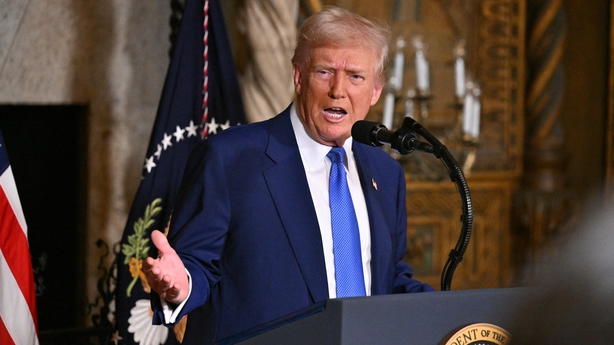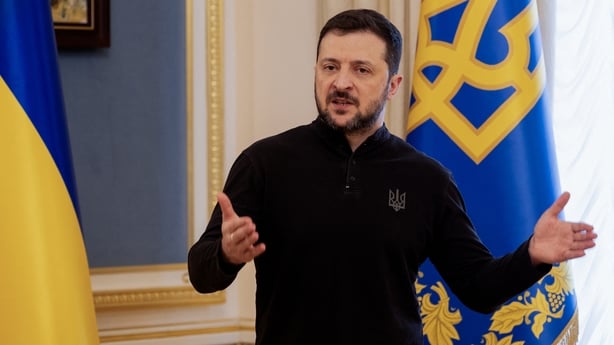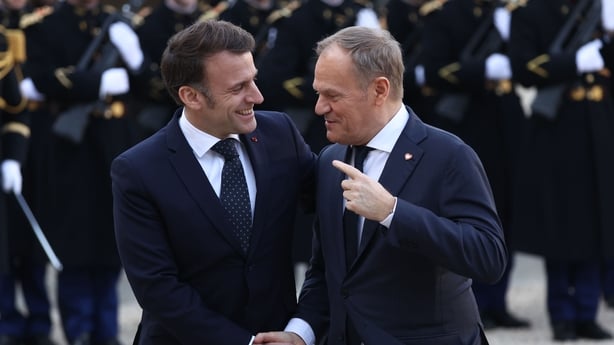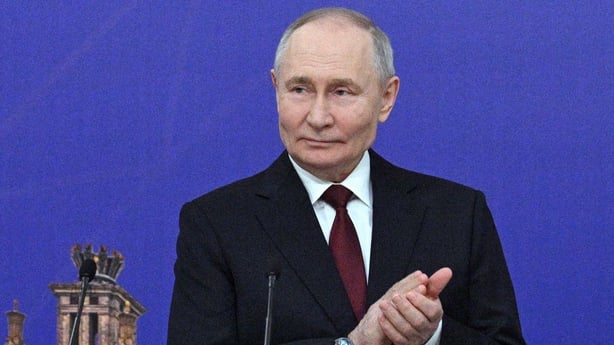The Trump administration's policy towards ending the war in Ukraine continues along an unpredictable path.
In the space of just one week, US President Donald Trump has moved from speaking at length with Russian President Vladimir Putin to actively criticising Ukrainian President Volodymyr Zelensky.
Wednesday's comments by Mr Trump - falsely accusing Ukraine of starting the war, calling Mr Zelensky a "dictator without elections" on his Truth Social platform and also stating that Ukraine's president only had a 4% approval rating - were plain bizarre and downright false.
Let’s set the record straight.
Mr Zelensky’s approval rating is higher than 50% according to recent monthly surveys by a leading Ukrainian research institute, Russia launched an unprovoked attack on Ukraine on 24 February 2022 by land, sea and air, and Mr Zelensky is not a "dictator".
The reality is that Ukraine's constitution forbids the holding of elections while martial law is in place, which has been the case in Ukraine since Russia invaded almost three years ago.
Read more: Why Zelensky fears Trump has fallen for Putin's lies
Mr Zelensky’s retort - that Mr Trump is living in a "disinformation space" - was measured but risky. That kind of comment will embarrass Donald Trump’s team, though maybe not the US president himself.
Already, US National Security Advisor Mike Waltz has told Kyiv to pipe down with its criticism in a clear sign that US-Ukrainian relations are now at a low ebb.
The decision by the US administration to cancel a planned press conference between their special envoy Keith Kellogg and Ukrainian officials did not bode well either.
At the same time, it is still unclear if Europe is any closer to getting a seat at any US-brokered peace talks.

US-European relations are still reeling from last weekend’s critical speech by US Vice President JD Vance in Munich and unilateral action by the US administration to engage Russia in talks.
Mr Trump’s insults, levelled at Mr Zelensky, have stunned the Europeans once again.
German Chancellor Olaf Scholz (who is facing a federal election on Sunday and could soon be out of office), British Prime Minister Keir Starmer and Scandinavian leaders offered strong words of support for Mr Zelensky’s democratic mandate.
French President Emmanuel Macron remained more diplomatic, holding back from criticising the US president.
Tánaiste and Minister for Foreign Affairs Simon Harris said yesterday that anyone who "attempts to blame Ukraine" for the war with Russia is "clearly engaging in revisionism on speed".
Here in Poland, Prime Minister Donald Tusk did not respond directly to Mr Trump’s comments but the speaker of the Polish parliament, Szymon Holownia, let loose, saying the US president’s remarks proved "a lack of knowledge of the history of Europe" and that "Europe does not seem to be particularly high on the list of priorities of the American administration".
Starting on Monday, European leaders tried to form a unified response to being sidelined by the US over the past week and come up with a coherent strategy to get back into the picture.

But talks in Paris on Monday did not deliver a watershed moment for Europe and Ukraine.
Instead, the meeting appeared to be a first exercise in sounding out the opinions of European leaders whose countries have been the largest donors of military aid to Ukraine.
NATO's Secretary-General Mark Rutte was in the room which suggests it was a military-focused debate.
Then yesterday, Mr Macron organised a video conference with a wider group of EU leaders, including Taoiseach Micheál Martin. It was a wise move by the French president whose project will need EU-wide support as it develops.
Deploying European peacekeepers to maintain the post-war peace in Ukraine could give Europe some leverage to be included in talks.
Britain and France appear ready to provide peacekeepers though Germany's Olaf Scholz says its too early for that kind of a discussion.
The leader of the centre-right CDU/CSU alliance, Fredrich Merz, who could lead Germany’s next government, said last December that deploying German peacekeepers would need Russia’s consent.

Poland's Donald Tusk said Polish soldiers would not be sent to Ukraine (he said the same in December and has not changed his tune).
All in all, the big European countries are still divided on the issue of peacekeepers, which reduces the bargaining power of offering peacekeepers in the first place.
Britain and France (and perhaps other smaller EU countries) would be taking on a heavy burden were they to deploy peacekeepers without the participation of the Germans and Poles. It would be a fractured operation from the start.
Also, going by what Mr Lavrov said in Riyadh on Tuesday, Russia will not accept any peacekeepers from NATO member states. That is a key hurdle that the US (and the Europeans if they get to that stage) will have to negotiate.
It is understood that Micheál Martin told the video conference of EU leaders yesterday that Ireland could provide peacekeepers to Ukraine if it was required under a UN-mandated ceasefire agreement.
But that scenario too is hypothetical and a long way off.
The EU and the UK also have leverage when it comes to sanctions against Russia.

On Tuesday during the talks in Riyadh, Mr Rubio referenced that Europe would be involved in talks at some stage given the amount of European sanctions in place.
Unfreezing Russian financial assets would carry a lot of weight with the Kremlin whose senior officials are sanctioned by the EU and the UK, along with all major Russian banks, energy exports and key goods.
Unlike the US with its global military reach, Europe cannot provide Ukraine with a security guarantee as part of a peace agreement.
Europe might be able to provide that kind of guarantee in 10 years' time if, as many European leaders plan, the continent ramps up defence spending and builds a strong defence industry.
But for now, it is not on the cards.
Mr Zelensky, or his senior negotiators, know that they will need Europe by their side at peace talks to make it an even contest.
Kyiv is still under pressure from Washington to sign a lucrative deal over Ukrainian mineral rights in return for some form of an American security guarantee.
It all seems to be going in Russia's favour at the moment, with Washington and Moscow, if not moving in lockstep, forming more common positions to end the war.
Europe needs to devise a plan quickly in order to be included.
The extent of Europe's involvement could be determined next week when Mr Macron and Mr Starmer will meet Mr Trump at the White House, on Monday and Thursday respectively.







